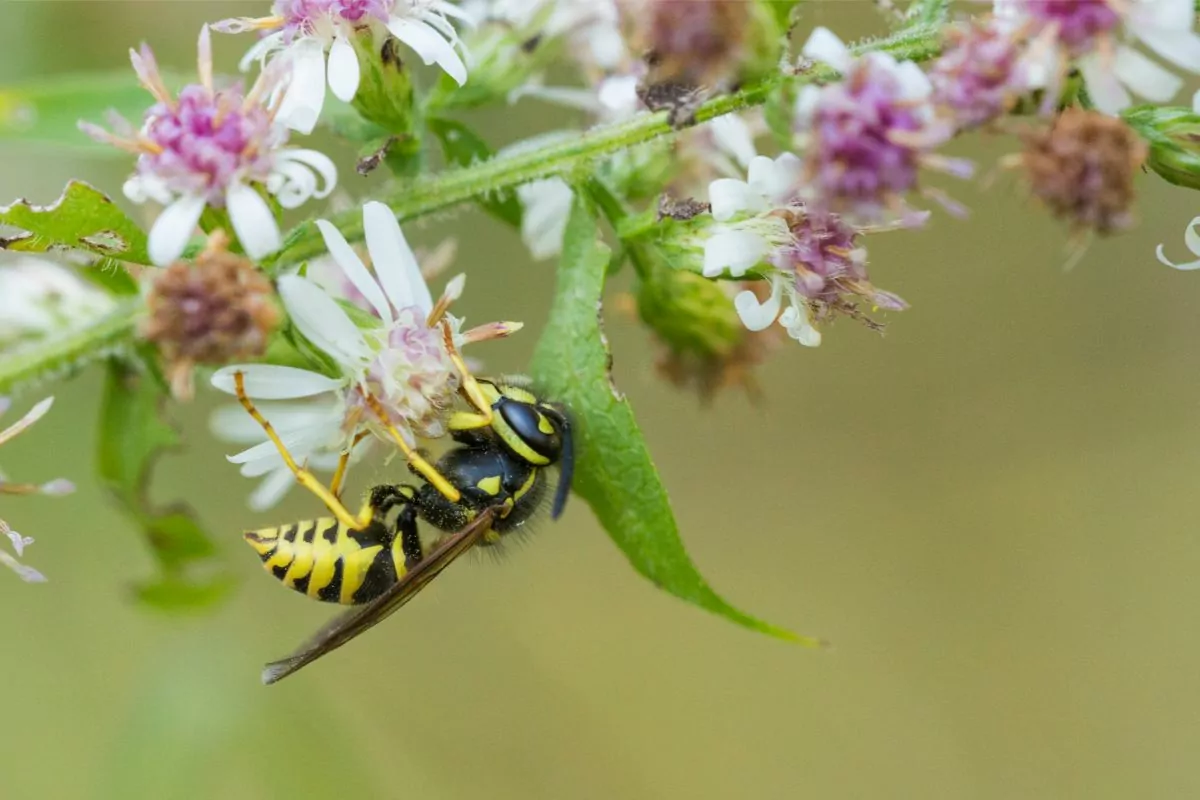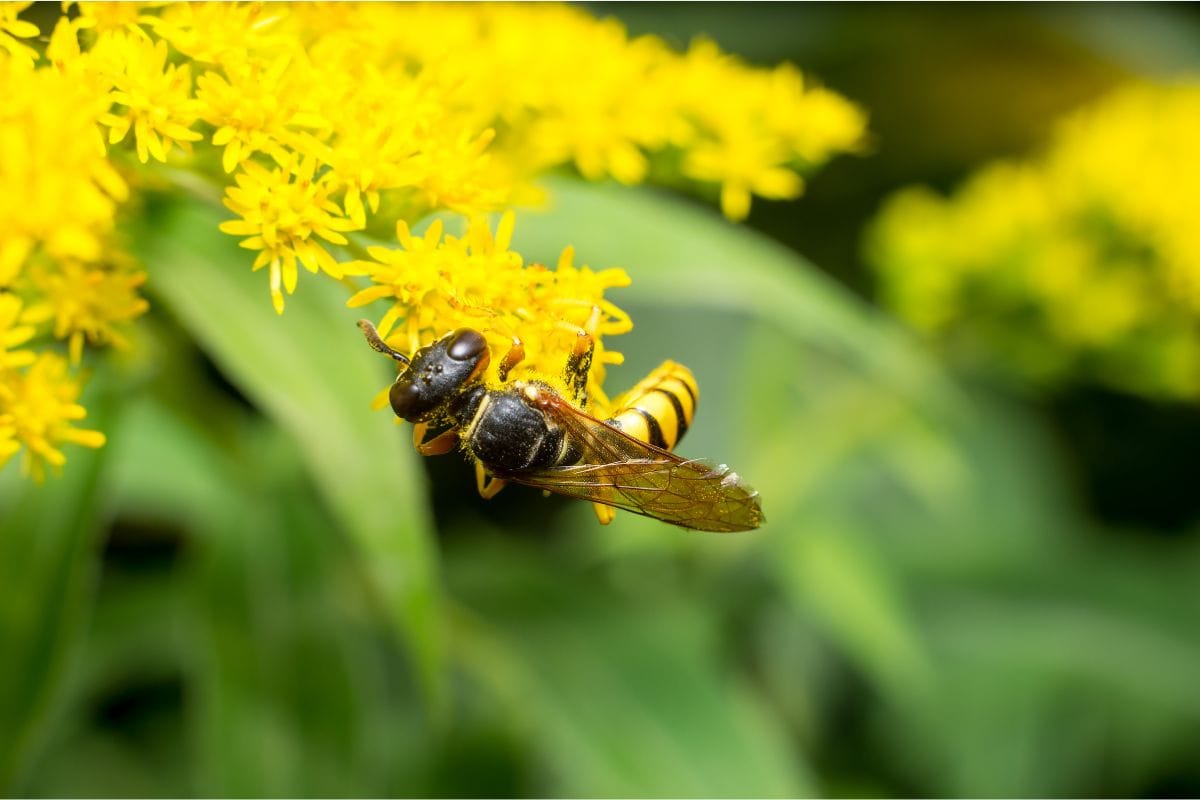When we consider the difference between wasps and bees, it very often comes down to the public perception of each of the two insects.
While most people love bees, thanks to their adorable fuzzy appearance, and their ability to create honey, many people similarly revile wasps as dangerous pests that serve only to cause pain and misery.

However, bees and wasps are not actually too dissimilar, and this can often come as a surprise to many people. But what are the ways that bees and wasps relate? What do they share in common?
And most importantly, do wasps pollinate as bees do?
If you’ve found yourself pondering any number of these questions, then you will want to keep on reading, because we have just the article for you! Prepare to find out everything you could need to know about wasps and dive in down below!
Are Wasps And Bees Related?
Yes! Many people often find themselves wondering whether wasps and bees are related, thanks to the fact that both insects have very similar black-and-yellow appearances and the ability to sting, yet having very different temperaments.
Wasps and bees are closely related thanks to the fact that they both belong to the Hymenoptera family of insects.
These are all variations of insects that store small amounts of venom that they can inject into a victim using the needle-like protrusion found at the back of the abdomen.
As we mentioned earlier, bees and wasps are not often thought of, by most people, as being related, because of how we perceive them.
When many people think of bees, they most often picture classic bumblebees, with their small, round, and fluffy bodies, and when we think of wasps we more commonly imagine their tough outer bodies and slightly more slender builds.
However, there are actually many different types of bees, and many of them have an appearance similar to bees!
In fact, it is generally believed that bees actually evolved from wasps, as a specialized version of a wasp that specifically pollinates flowers and produces honey!
Do Wasps Pollinate Like Bees?
Now that the striking similarities between bees and wasps are clear, we can finally find out whether wasps pollinate in a way similar to bees.
Well, we can say for certain that, yes, wasps do pollinate flowers, but they do so slightly differently. As we mentioned above, classic bumblebees, and indeed many varieties of bees, have small fuzzy hairs across their bodies.
These small hairs help to grab pollen from flowers, and then hold onto them, to deposit them onto other flowers.
Wasps, on the other hand, do not have these fuzzy hairs, and thus they are not able to pick up quite as much pollen.
Regardless of this fact, however, wasps do pollinate flowers, and it is how they are able to derive a lot of energy that they need to function!

What Else Do Wasps Do?
So, while wasps might pollinate flowers, you might wonder what else they do that makes them worthwhile.
Wasps are actually a very natural form of pest control, and they play a crucial role in making our environment much more pleasant and enjoyable.
Wasps naturally hunt down invasive insect species like spiders, caterpillars, and even greenflies. These particular insects can wreak havoc on gardens, and thus many gardeners appreciate the extra assistance that wasps help to provide.
Wasps are also very skilled at building nests, and they are able to build incredibly versatile homes that can house massive numbers of wasps. Wasp nests can also easily house hoverflies, which are another type of pollinating insect!
All around, wasps do a massive amount of good for the planet, so while they might prove annoying while eating your picnic, try to be patient with them!
Why Do Wasps Sting?
Another reason why wasps tend to be commonly reviled is because of their ability to sting. Wasps are much more likely to sting than bees, because of the fact that stinging their prey does not impact them.
Bees, on the other hand, will die if they sting a perceived threat, thanks to the fact that their stings are directly attached to the body.
Wasps tend to sting when they perceive an individual as a threat, and when they feel as though they need to work to defend their nests.
The sting of a wasp, unlike that of a bee, is smooth-shaped, so it can be pulled right out after it has injected venom into the target.
The reason why you might be more likely to be stung by a wasp is simply that there is no sacrifice when they use their sting, so they can afford to use it a little more liberally.
Bees, on the other hand, must consider if and when to use their stings!
To Finish Up
There you have it! Wasps do pollinate flowers, but they do not do it quite as efficiently as bees.
In fact, the reason why bees are so efficient at pollinating is because of the fact that they directly evolved from wasps with the express purpose of pollinating! They quite literally evolved to do the job!
Make sure to be patient with wasps, because while they may not be the most effective pollinators, they do plenty of other jobs that help to keep our planet healthy, including preying on pests that would otherwise ruin crops!
Frequently Asked Questions
Wasps move pollen from flower to flower, much like a bee does. They also take the nectar from flowers as a food source.
Wasps tend to live for around 12 to 22 days, but queen wasps can live up to a year!
Wasps help gardeners out by eating pest insects that would otherwise damage crops!
- Does Bleach Kill Bees? - April 23, 2024
- How Do I Get Rid of Ants Without Harming Bees? - April 16, 2024
- Do Bug Zappers Kill Bees? Completely Explained - April 9, 2024
